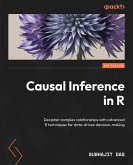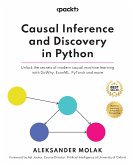Causality is the influence that one event, process, state, or object (referred to as a cause) has on the production of another event, process, state, or object (referred to as an effect), where the cause is partially responsible for the effect and the effect is partially dependent on the cause. Causality is also referred to as causation, which is another name for the cause and effect relationship. In a general sense, a process has a number of causes, which are sometimes referred to as causal factors for the process, and all of these causes are located in the process's past. It is possible for one effect to be a cause or a part in the chain of causation that leads to numerous other effects, all of which lie in the future. The idea that causation is metaphysically primordial to concepts such as time and space has been advanced by a number of authors.
How You Will Benefit
(I) Insights, and validations about the following topics:
Chapter 1: Causality
Chapter 2: Causality (physics)
Chapter 3: Correlation does not imply causation
Chapter 4: Counterfactual conditional
Chapter 5: Granger causality
Chapter 6: Causal model
Chapter 7: Probabilistic causation
Chapter 8: Causal reasoning
Chapter 9: Causal inference
Chapter 10: Exploratory causal analysis
(II) Answering the public top questions about causal calculus.
(III) Real world examples for the usage of causal calculus in many fields.
(IV) 17 appendices to explain, briefly, 266 emerging technologies in each industry to have 360-degree full understanding of causal calculus' technologies.
Who This Book Is For
Professionals, undergraduate and graduate students, enthusiasts, hobbyists, and those who want to go beyond basic knowledge or information for any kind of causal calculus.
Dieser Download kann aus rechtlichen Gründen nur mit Rechnungsadresse in A, B, BG, CY, CZ, D, DK, EW, E, FIN, F, GR, H, IRL, I, LT, L, LR, M, NL, PL, P, R, S, SLO, SK ausgeliefert werden.









